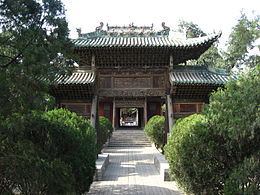Haizhou Emperor Guan Temple
| Haizhou Guandi Temple | |
|---|---|
 | |
| Religion | |
| Affiliation | Taoism |
| Location | |
| Location | Haizhou, Yuncheng, Shanxi[1] |
| Country | China |
| Architecture | |
| Date established | 589[2] |
Haizhou Emperor Guan Temple[3] (simplified Chinese: 解州关帝庙; traditional Chinese: 解州關帝廟), or Haizhou Guandi Temple,[4] is a temple located in Haizhou Town, Yanhu District, Yuncheng City, Shanxi Province.[5] It is hailed as "the grand ancestor of temples dedicated to Guan Yu" (关庙之祖).[6] The Temple is the largest extant palace-style Taoist complex and martial temple in China.[7]
Haizhou Emperor Guan Temple is the largest Emperor Guan Temple (关帝庙) in China.[8] It has a total area of 220,000 square meters, with more than 200 rooms.[9]
History
Haizhou Emperor Guan Temple was established in the ninth year of Kaihuang (开皇) in the Sui Dynasty (589), expanded and rebuilt in the Song Dynasty and Ming Dynasty.[10]
Haizhou Emperor Guan Temple was destroyed by fire in the forty-first year of Kangxi (1702) in the Qing Dynasty and was restored after more than ten years.[11]
Conservations
In 1957, Haizhou Emperor Guan Temple was designated by the Shanxi Provincial People's Government as the first batch of provincial-level key cultural relics protection units in Shanxi Province.[12]
In 1988,[13] Haizhou Emperor Guan Temple was listed as a Major Historical and Cultural Site Protected at the National Level in China.[14]
References
- ^ "Eight boutique lines leisure tour of Shanxi". Xinhuanet.com. 2015-07-24.
- ^ Hu Miaosen; Jiang Zhuping (2005). China Building Map. Bright Daily Press. pp. 98–. ISBN 978-7-80145-913-8.
- ^ Stanley Henning (9 March 2018). Henning's Scholarly Works on Chinese Combative Traditions. Via Media Publishing. pp. 73–. ISBN 978-1-986369-24-4.
- ^ "Haizhou Guandi Temple Cultural Resource Development of Cultural Industry Perspective". China National Knowledge Infrastructure. 2017-10-16. Archived from the original on 2021-03-13. Retrieved 2021-03-08.
- ^ "Haizhou Emperor Guan Temple (photoes)". Sohu News. 2007-05-13.
- ^ Michael DeMarco (17 August 2016). Bagua and Xingyi: An Intersection of the Straight and Curved. Via Media Publishing. pp. 128–. ISBN 978-1-893765-33-7.
- ^ "National Day Long Vacation Shanxi waiting for you to come". Science Guide. 2019-09-24.
- ^ "More than 40 stone monkeys "hide" in China's largest Emperor Guan Temple". Xinhuanet.com. Feb 25, 2016. Archived from the original on March 10, 2021. Retrieved March 8, 2021.
- ^ "Aerial photography of Haizhou Guandi Temple in Shanxi". China News Service. 2016-09-26.
- ^ "Shanxi promotes tourism in Northeast China". China Daily. 2015-06-25.
- ^ "Haizhou Guandi Temple in Yuncheng". China News Service. 2007-05-26.
- ^ "Haizhou Emperor Guan Temple". China National Knowledge Infrastructure. 2016-10-14.
- ^ ""Guan Sheng Cultural Complex" heritage application materials will be submitted to the State Administration of Cultural Heritage". China News Service. 2014-03-27.
- ^ "Shanxi Haizhou Emperor Guan Temple Scenic Area". Xinhuanet.com. 2018-05-11. Archived from the original on March 9, 2021.
- Guandi temples
- Taoist temples in China
- 6th-century establishments in China
- Buildings and structures completed in the 6th century
- Historic buildings and structures
- Major National Historical and Cultural Sites in Shanxi
- Buildings and structures in Yuncheng
- Tourist attractions in Yuncheng
- Chinese history stubs
- People's Republic of China religious building and structure stubs


